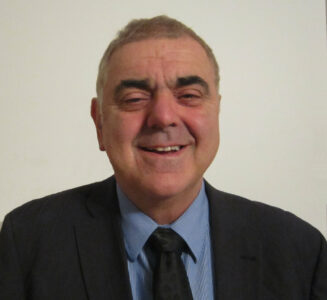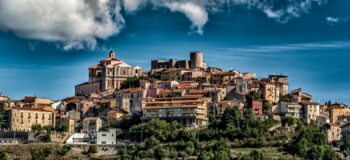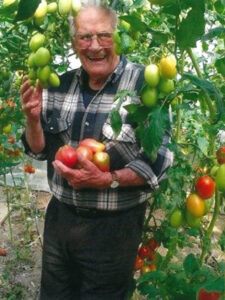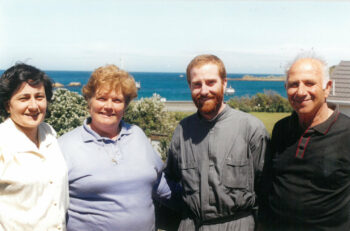A Migrant’s Story

By Paul Elenio
My father-in-law was 95 when he died recently, a life of work and service in a land that was never meant to have been his home.
Giuseppe Lagrutta was 26 when he reluctantly came to New Zealand in 1952. He came at the behest of his uncle, an earlier immigrant from Moliterno, in the south of Italy, to help grow tomatoes in the glasshouses that once populated The Wood, a suburb close to the centre of Nelson.
Writing the eulogy and subsequently an obituary – offered for publication in the Nelson Mail but published online and in other newspapers in the Stuff group – inevitably led to a contemplation about the many hurdles that migrants and refugees face when leaving home for distant lands.

The town of Moliterno in Southern Italy where Giuseppe Lagrutta was born
When Giuseppe and others arrived from a country still recovering from war and subsistence living, the one constant in his life in a new country was the Catholic Church.

Guiseppi “Joe’ Lagrutta
Settling down in New Zealand in 1952, Giuseppe, and others like him, faced a string of challenges. Language was the biggest hurdle, a problem not quickly overcome but dealt with through a reliance on others who had arrived earlier and gained a smattering of an understanding of English.
For most, finding work that did not require fluency in the language was the priority. This was needed not only to meet the cost of living but also to earn money to repay the large debt, the cost of the voyage lent by a family member.
There was also a strong commitment to saving money and sending it ‘home’ so that family members in Italy could share in the ‘buona fortuna’ – the better life they were leading.
In the case of Italian migrants to the Wellington region and Nelson, the men found work in horticulture and the fishing industry, and the women in factories making clothes and hosiery (Giuseppe’s wife, Maria, worked for the Bonds factory).
The cultural differences were huge and most keenly felt in food. Italian migrants were certainly not the only ones who took a lot of time to get used to, what was to them, greasy meats and overcooked vegetables. They overcame those problems by making their own pasta, cheeses and sweets – all now commonly available in supermarkets.
The Church provided a weekly respite for the migrants. Mass was celebrated in Latin, just as it was in Italy. The familiarity was comforting, even if the sermon was delivered in English.
In Wellington’s Island Bay Italian families turned out in their Sunday best at St Francis de Sales while the Nelson tomato growers and their families were regulars at St Mary’s in the city.
The Italians mingled socially at baptisms, first communion and confirmation celebrations and at weddings. Many also belonged to Club Garibaldi in Wellington, established in 1882, and Club Italia in Nelson, which last year celebrated 90 years of bringing people together.
It shouldn’t be forgotten, though, that community acceptance of migrants, and in particular for those from Italy, was not a given. Like others, the Italians were accused of taking jobs from ‘real Kiwis’ and the resentment and strong feelings were most evident during the Second World War when Italy and New Zealand were enemies.
While Sunday Mass brought migrants and the ‘real Kiwis’ together it took many years for some of the harsh thoughts and feelings to dissipate.
For the Italians, there were opportunities to reinforce the Faith with visits by priests to hold special missions every five or six years A priest would arrive from Italy and spend 3-4 weeks in the communities. He would say Mass daily in Italian and visit a different household each night where the Rosary would be recited in Italian.
As children we didn’t look forward to the arrival of these missionaries. We had to go to Mass every day and we noticed that sermons seemed to be a lot of fire and brimstone and took twice as long as normal!
The first of the missionary priests came from Italy, but later they were from Sydney, which had more than 200,000 migrants from Italy to serve.

A visiting Italian priest with parishioners, Island Bay, Wellington
Occasionally there would be a Mass celebrated in Italian by Father Mate Kolic, a Croatian priest who had learned the language while based in Rome and he was welcomed into many of the migrants’ homes to share their hospitality and gratitude.
In more recent years, the Italian community in Wellington enjoyed attending a Mass in their native language once a month at St Francis de Sales. These Masses would be celebrated by the Papal Nuncio or his secretary and sometimes would be followed by a shared lunch at Club Garibaldi.
Numbers dwindled at the Italian Mass as the number of migrants born in Italy fell away and eventually the Mass was discontinued.
Many of these migrants retained strong beliefs with a passionate devotion to Mary.
An example was my mother. She worried when my father went fishing in Cook Strait and prayed every day for his safe return. She had heard the story of the boat, crewed largely by Italian migrants, that foundered in a southerly storm on the eastern side of the coastline in the 1930s.
On fortunately rare occasions, one of the 40-odd fishing launches that anchored in Island Bay would not return on time. When this occurred with the boat my father was crewing, my mother became so distraught she put her prayers into action by parcelling up all her small trove of gold jewellery and posted them to Italy, to be placed at the feet of a statue of the Virgin Mary.
Her offering, sacrifice and prayers were effective. Three days after going missing the boat and its four crew were located sheltering in Tory Channel to avoid a southerly storm that was battering the strait.
The devotion to Our Lady was also evident as the special statue of the mother of Jesus was passed from one Island Bay family to another as the centrepiece of the nightly praying of the Rosary.
The women migrants in particular demonstrated their commitment to their church as members of the altar society, keeping the altar clean and decorated with flowers, and in fund-raising for the schools their children attended.
Most of those migrants have passed on, but we first-generation Italian New Zealanders retain strong memories of the devotion and sacrifice of our parents.
Paul Elenio is Giuseppe Lagrutta's son-in-law and a former deputy editor of The Evening Post newspaper. He and his wife Maria are parishioners at St Francis de Sales, Island Bay, Wellington.
 Entries(RSS)
Entries(RSS)